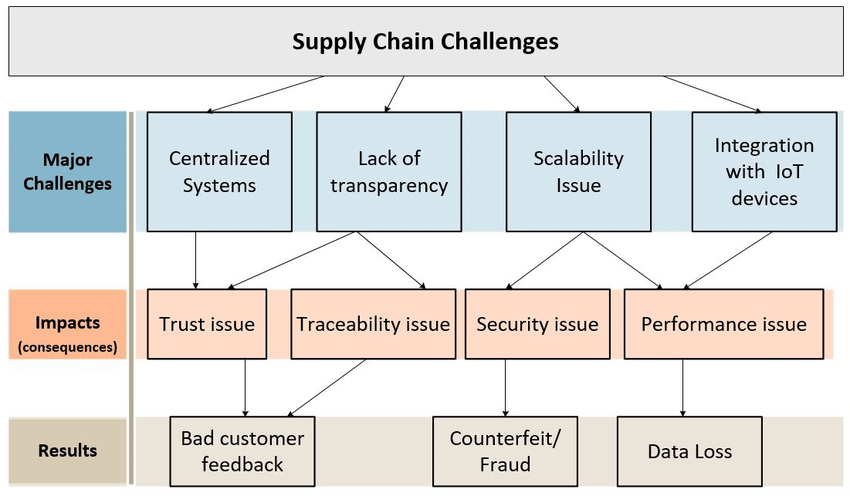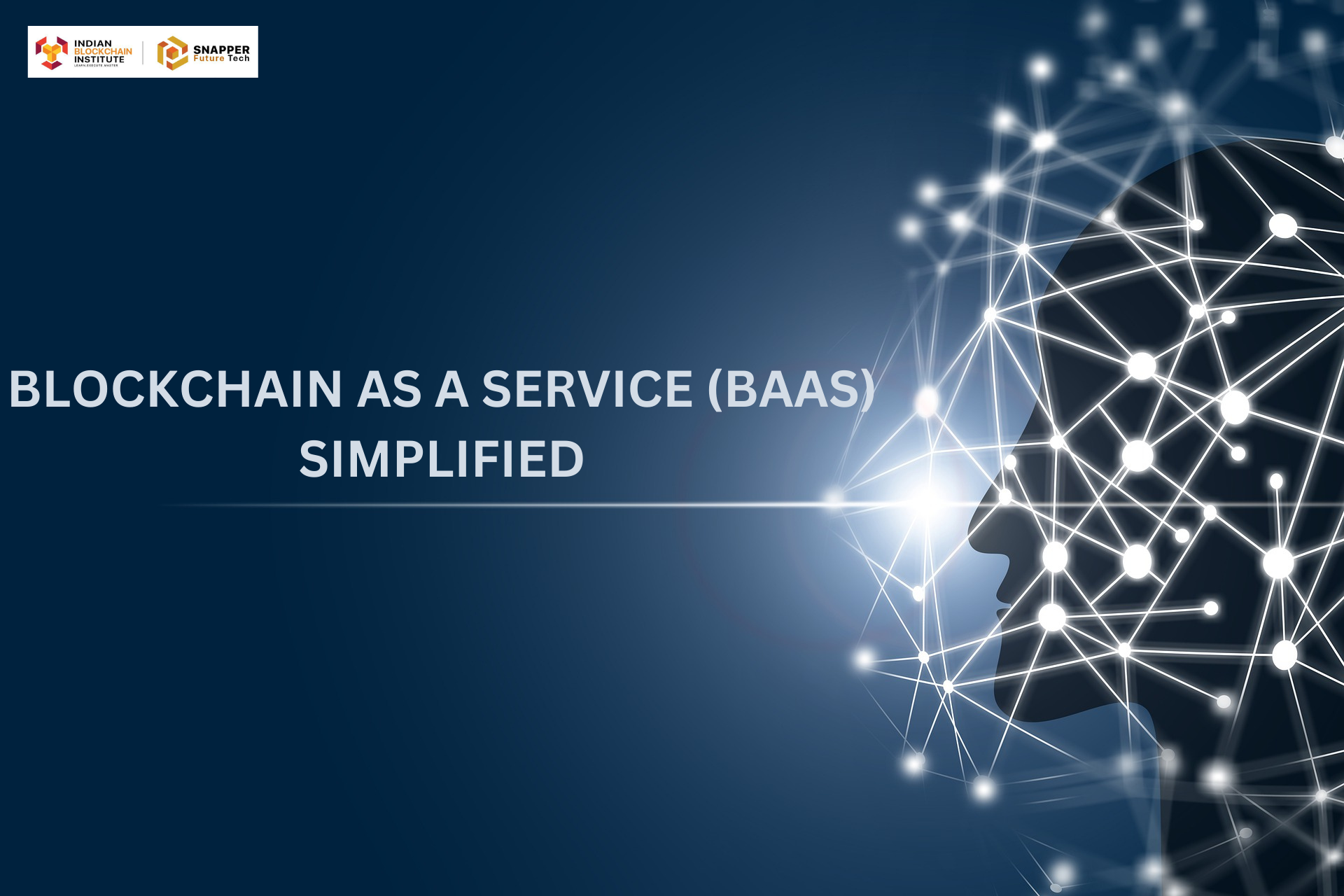The supply chain is the heart of every business operation. The manufacturing, distribution, and retail sectors all depend heavily on supply chain management. But as per the current scenario, our supply chain management is broken in several ways. In the history of the supply chain there have been many innovations. Blockchain can increase the efficiency and transparency of supply chains and positively impact everything from warehouse to delivery to payment.
Supply chain challenges
The purpose of the supply chain management system is often to boost sales, lower manufacturing costs and complexity, reduce fraud, and speed up production and distribution. However, a number of internal and external constraints, including greater complexity, demand volatility, and a shifting retail environment, are posing increasingly difficult problems for our current supply networks. More transparency is being demanded by consumers. on the origins of their products. Because of this, consumers are willing to pay more to businesses that have more transparent supply chains. The supply chain unavoidably gets opaque and exceedingly inefficient as the manufacturing process becomes more complicated, possibly to the point where it is broken.
Current supply chain challenges
No universal database
Despite the fact that our world has become interconnected, various organizations are still keeping their database confined to themselves. All the teams are making their individual records and sharing with each other only on request. A result of this is that there are various communication gaps between any two parties, which benefits the exploiters.
Inability to satisfy customer needs
Entrepreneurs are also finding it hard to stay updated with changing user demands and bringing required changes into their working strategies, when going with the current supply chain management process.
Because of such issues in the supply chain and the rising competition, most of the firms, if not all, have started showing an interest in the concept of introducing Blockchain in the supply chain
Inadequate assets traceability
Another challenge found in supply chain management is the inability to trace assets. They have introduced the finest of equipment and processes for keeping an eye on in-house activities, but no such method to trace the state of products once out for delivery. This is making it easier for exploiters to replace the original product with ‘lookalike’ counterfeit ones.
Undue costs
Since every team creates and maintains an individual database of data, they often invest their efforts and capital into gathering the same information again and again. This brings a drastic rise in the associated cost.
Labour shortages and efficiency slowdowns
Things aren’t getting manufactured or sold to consumers as quickly as they normally would because workplaces have dealt with lockdowns, COVID-19 outbreaks, quarantines, and burnout by workers. Even when workers can perform their jobs, extra workplace safety measures are also slowing down efficiency
Shipping delays
The shipping industry has been hit especially hard by labour shortages, which contributed to the unprecedented congestion occurring at shipping ports and train yards around the world. So did other factors like economies around the world reopening and the demand for goods increasing.
Blockchain as a solution
Blockchain is poised to transform business. In physical supply chain, the main BCT benefits for businesses are ensuring real-time traceability with trusted information and high level of reliability to all supply chain members with openness, transparency, reliability and security and providing pseudo real-time status of the shipment. BCT can increase the transparency of physical distribution process and eliminate the ability to cheat and provides each participant end‐to‐end visibility based on their level of permission. In addition, this technology could reduce operational costs by removing intermediaries’ fees. For government, BCT could help to track, monitor and audit the supply chain and serve manufacturers to record the transactions in authenticity. For customers, BCT would enhance the products’ quality and safety.
Blockchain can drive increased supply chain transparency to help reduce fraud for high value goods Because of Blockchain Organizations can digitize physical assets and create a decentralized immutable record of all transactions, making it possible to track assets from production to delivery or use by end user. This increased supply chain transparency provides more visibility to both businesses and consumers.
Benefits of Blockchain in Supply Chain Management
Efficiency
Blockchain technology can increase efficiency by automating procedures using smart contracts. A smart contract is a software that runs on the Blockchain when certain circumstances are satisfied. For instance, a smart contract could stipulate that payment for items is given to the supplier after a shipment arrives at a manufacturing facility. This avoids many unnecessary stages that would ordinarily be required in traditional transactions.
Accuracy
Supply chain accuracy can be aided by blockchain technology. Because data is transmitted in real time between partners, everyone in the network has access to the most current information – no more emailing your supplier to inquire about the position of your product. The data can be trusted since each block of data is encrypted and cannot be tampered with.
Improved Collaboration
Blockchain helps negate intermediary requirements, saving businesses both money and time, while improving relationships. Blockchain used throughout the logistics industry decreases miscommunications and errors, allowing for different suppliers within the global supply chain to work together more efficiently and effectively.
Traceability and Transparency
Blockchain helps supply chain management process by creating a traceable digital record. Traceability and trackability are especially beneficial when a food safety or medication safety issue arises and may event prevent safety issues from ever occurring. Blockchain technology combines increased supply chain transparency with smart contract technology. Additional benefits blockchain offers businesses include distributed ledger technology and management systems compatibility.
Optimized Security
Security should always be a top business priority. Blockchain helps supply chain professionals keep data secure throughout the entire global supply chain. The security that blockchain provides businesses improves their reputation and boosts credibility. Supply chain malpractice is greatly minimized, decreasing the likelihood of costly and damaging public relation risks.
Conclusion
In other words, using Blockchain can transform supply chains and whole industries in any sector or organization. This technique reduces the amount of manual waste that comes from handling documents. A case study shows that supply chain management is actually a strategic undertaking and not just a way to decrease costs. Since practically every move taken by leading businesses aims to meet the demands of customers, they have a very strong customer focus.






Leave a Reply